Vous trouvez ici le catalogue des livres édités par le CETIM depuis sa fondation, en 1970.
Nos collections:
Collection PubliCetim. Des livres publiés par le CETIM ou collectifs dans un format poche. Souveraineté alimentaire, droit international, relations Nord/Sud, luttes pour l’émancipation des peuples et leur histoire, questions des migrations, environnement, modes de transformation de nos sociétés, sociétés transnationales…
Collection Pensées d’hier pour demain. Propose au public, jeune en particulier, de courts recueils de textes d’acteur.trices qui ont été au coeur de la lutte des peuples pour l’émancipation.
Collection Hors-série. Livres publiés en co-édition avec des organisations partenaires ou ne rentrant pas dans le format poche de la collection PubliCetim.
Des exemplaires imprimés des livres des 3 collections sont disponibles dans la mesure des stocks disponibles.
Maria Lucia Fattorelli. Traduit de l'espagnol par Julie Duchatel et Florian Rochat
2015 – 264 pages
A guide prepared with contributions from researchers and activists from around the world aimed at encouraging civil society campaigns for conducting Citizens Public Debt Audits based on transparency and the participation of society, in order to reveal the truth about the Debt System that subjugates most of the countries and their population.
Melik Özden
2014 – 102 pages
The recognition of the right to land, a historic demand by peasant movements throughout the world, is gaining momentum at the international level. This publication takes stock of this major issue of our times. It is the result of major research and inquiry, and the fruit of close collaboration with La Vía Campesina…
Melik Özden
2023 – 414 pages
Unlike the electronic version, the printed book will unfortunately only be available in French. Click here to download a free PDF of book ‘Economic, social and cultural rights: a legal lever in the fight for social justice’. At a time when the world’s multidimensional crisis is plunging billions of persons into poverty, when almost half of humanity is unable to satisfy their essential needs, even as inequalities continue to grow steadily, the fulfillment of economic, social and cultural rights is more than ever urgent.
– pages
From the start, various NGOs have been raising questions about the alleged benefits and risks of Global Compact, a high level interaction between the United Nations and the business community. This publication, commissioned by CETIM, Geneva Infant Feeding Association (GIFA-IBFAN) and Déclaration de Berne does not aim to summarize all of these concerns. It rather suggests focusing on two main lines of questioning. These two line emerge from the debates between the Global Compact proponents and its critics: What is the value of the Global Compact in terms of changing corporate practices? More specifically, is it an arrangement that helps shift corporate practices towards the better – or is it rather an arrangement that helps corporations continue to do their business as usual and moreover confers on them additional protection from legally-binding regulation and public pressure? What is the relationship between the Global Compact and global democratic governance? In other words: Does the Global Compact enhance – or undermine – efforts to promote democratic decision-making in a globalising world? Both these questions are addressed at a theoretical level as well as by a case study focusing on the gaps between words and deeds, illustrated with the case of one of the latest prominent participants of the Global Compact: the food and beverage transnational Nestlé. Dr. Judith Richter is author of Holding Corporations Accountable: Corporate Conduct, International Codes and Citizen Action, Zed Books, London and New York, 2001 and ‘We the Peoples’ or ‘We the corporations’, Critical reflections on UN-business partnerships, IBFAN-GIFA, January 2003.
Ouvrage collectif
1975 – pages
An european study compiled and produced by Angola Comité/Amsterdam, Anti-Apartheid Movement in Britain/London, Anti-Apartheid Movement in Ireland/Dublin, Boycot Outspan Aktie/Leiden, Centre Europe – Tiers Monde/Geneva, Comité contre le colonialisme et l’apartheid/Brussels, Ecumenical Research Exchange/Rotterdam, Informationsstelle Südliches Afrika/Bonn, International Defence and Aid Fund for Spouthern Afrika/London
CETIM
1975 – pages
Coline Hubert
2019 – 200 pages
CLICK HERE TO DOWNLOAD THE E-Pub: The UN Declaration on the Rights of Peasants.epub CLICK HERE TO DOWNLOAD THE PDF: The UN Declaration on the Rights of Peasants.pdf Due to a lack of staff (we are a small associative publishing house), we are unable to provide technical support. So please read the following carefully: “The United Nations Declaration on the Rights of Peasants” by Coline Hubert in Epub 2 format is compatible with most readers, with the exception of the Amazon Kindle reader which requires a file conversion. The Kindle Previewer application will allow you to convert it to Mobi format and send it to your Kindle with the Send to Kindle option. To read this file on a Windows Mac or Linux computer, we recommend the TEA Ebook software.
Melik Özden
2016 – 112 pages
Multinationals with great economic and political power violate human rights, very often, with almost total impunity. These entities escape legal action. This publication demonstrates the necessity and urgency of having a binding international instrument to sanction those multinationals responsible. CETIM’s publication also highlights how important it is to enable the victims to obtain compensation.
Samir AMIN, François HOUTART
2000 – 28 pages
The construction of a unipolar world by the triad, the United States, Japan and Europe, is th unilateral imposition by the dominant capital of transnationals and the deployment of the American military empire to which all nations would be constrained to submit. The hegemonic strategy of the United States and its NATO allies is today the prinicple adversary of social progress, of democracy and peace in the world.
CETIM/AAJ
2000 – 176 pages
This booklet has been designed as an information and reflection material intended for the Working Group of the Sub-Commission on Human Rights of the United Nations. It is not limited to this framework and fits into a working process on the impact of transnational corporations (TNCs) on human rights.
CETIM/AAJ
2001 – 40 pages
CETIM/AAJ
2002 – 40 pages
Joint publication
2006 – 96 pages
This little guide is intended to serve as a support tool for such efforts and as a tool of popular education indented for social movements, citizen reds, Members of Parliament, jurists, economists and other rebels.
Melik Özden et Christophe Golay
2005 – 55 pages
The right to food is a human right. It is universal, acknowledged at the national, regional and international level, and applies to every person and group of persons. Currently, however, some 852 million persons throughout the world are seriously –and permanently– …
Melik Özden et François Ndagijimana
2006 – 40 pages
In paragraph 3 of the common preamble to the two International Conventions of Human Rights – the International Covenant on Civil and Political Rights and the International Covenant on Economic, Social and Cultural Rights – the states parties acknowledge …
Melik Özden
2006 – 68 pages
At first glance, it might seem misplaced to speak of health as a right when ever increasing segments of the world’s population are witnessing a steady degradation in the state of their health, to the point where their very existence is threatened …
Melik Özden
2007 – 48 pages
Although forbidden by international humanitarian law and defined by the Statute of Rome (the International Criminal Court) as a “crime against humanity” (art 7.2.d), forced displacements are still largely practiced in our time during armed conflict and in various …
Melik Özden
2007 – 40 pages
The last decade has been marked by an unprecedented increase in inequalities and a spectacular growth of the gap between “developed” countries and those of the Third World as well as the growth of a gap within countries themselves …
Showing 1–16 of 32 results
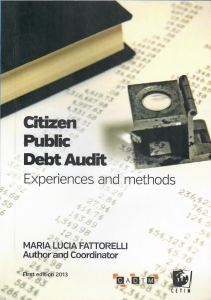
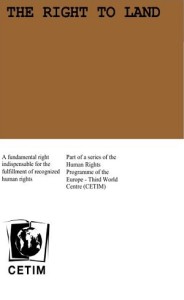
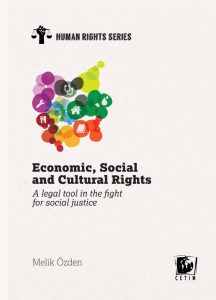

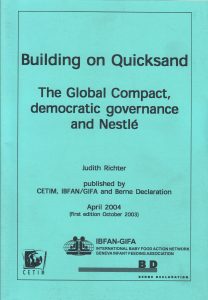
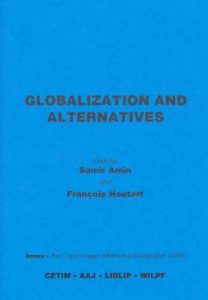

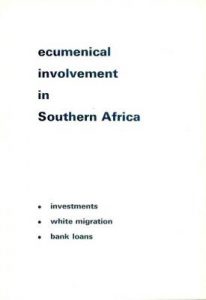
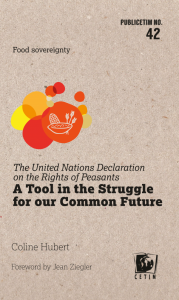
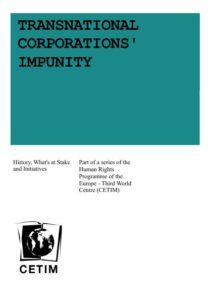
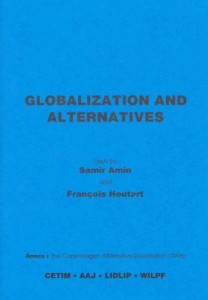
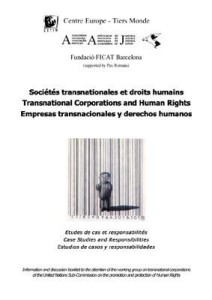
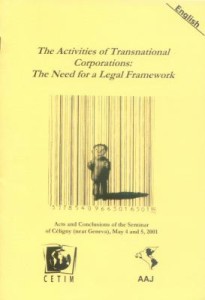
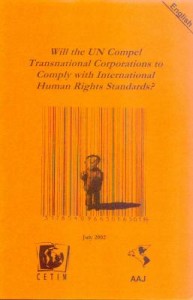
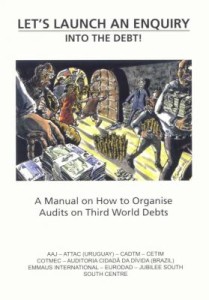
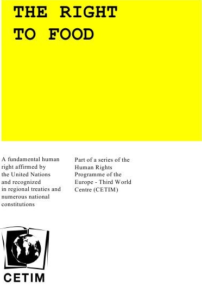
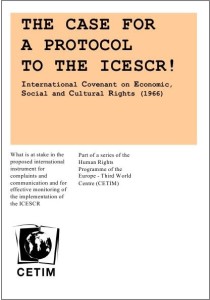
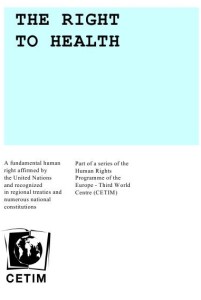
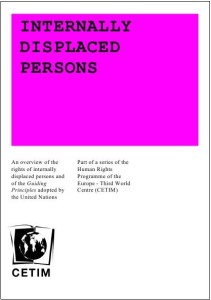
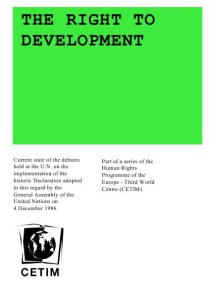
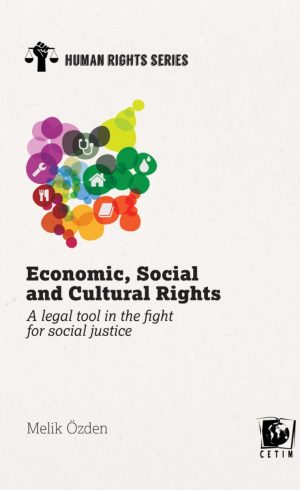
Economic, Social and Cultural Rights: A legal tool in the fight for social justice
CHF 25.00
Read more
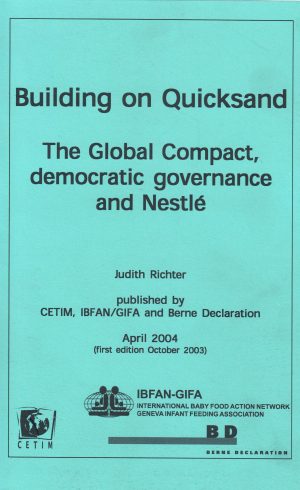
PDF “Building on Quicksand: The Global Compact, democratic governance and Nestlé”
CHF 3.00
Add to cart
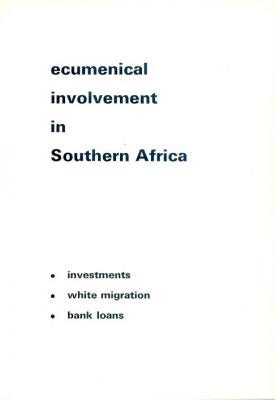
Ecumenical involvment in Southern Africa: investments, white migration, bank loans
CHF 5.00
Add to cart
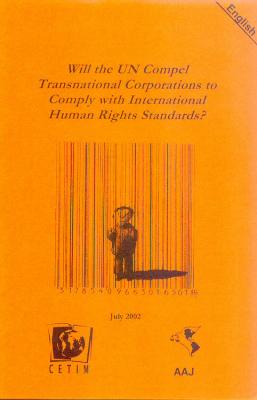
Will the UN compel Transnational Corporations to comply with International Human Rights Standards?
Read more